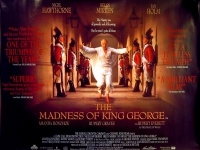Why does my soul feel so bad?
These open doors, these open doors...
Please could you stop the noise,
I'm trying to get some rest
From all the unborn chicken voices in my head
What's that?
What's that?
When I am king, you will be first against the wall
With your opinion which is of no consequence at all
What's that?
What's that?
Ambition makes you look pretty ugly
Kicking and squealing Gucci little piggy
You don't remember
You don't remember
Why don't you remember my name?
Off with his head, man
Off with his head, man
Why don't you remember my name?
I guess he does...
Rain down, rain down
Come on rain down on me
From a great height
From a great height, height
Rain down, rain down
Come on rain down on me
From a great height
From a great height, height,
Rain down, rain down
Come on rain down on me...
That's it, sir
You're leaving
The crackle of pigskin
The dust and the screaming
The yuppies networking
The panic, the vomit
The panic, the vomit
God loves his children,
God loves his children, yeah!

“I am fundamentally an optimist. Whether that comes from nature or nurture, I cannot say. Part of being optimistic is keeping one’s head pointed toward the sun, one’s feet moving forward. There were many dark moments when my faith in humanity was sorely tested, but I would not and could not give myself up to despair. That way lays defeat and death...”
“If you talk to a man in a language he understands, that goes to his head. If you talk to him in his language, that goes to his heart...”
Nelson Mandela died today..

Victor: Nobody likes scientists.
Mr. Rzykruski: They like what science gives them, but not the questions, no. Not the questions that science asks.
Victor: [thinks for a second] Actually, I have a question.
Mr. Rzykruski: He, he. That is why you are a scientist.
Victor: I was doing my experiment, my project, and the first time it worked great, but the next time it didn't. I mean, it sort of worked, but then it didn't. And I don't know why.
Mr. Rzykruski: Then maybe you never really understood it the first time. People think science is here [points to his head], but it is also here [places his hand on his chest]. The first time, did you love your experiment?
Victor: Yes. [thinks of Sparky licking his hand]
Mr. Rzykruski: And the second time?
Victor: [Thinks of the invisible fish] No. I just wanted it over.
Mr. Rzykruski: Then you changed the variables.
Victor: I was doing it for the wrong reason.
Mr. Rzykruski: Science is not good or bad, Victor. But it can be used both ways. That is why you must always be careful...
Next movie
#221 The Madness of King George
24 April 2025, 3:00 pm
I’m the King of England! A man can have no better conceit of himself than that!

